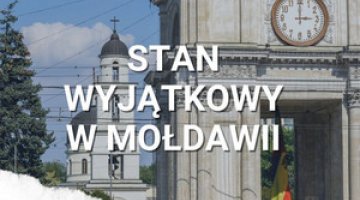Moldova’s new (old) government: security, economy and integration with the EU
On 16 February, the Moldovan parliament passed a vote of confidence in the government headed by Prime Minister Dorin Recean, a former security advisor to President Maia Sandu and Moldova’s interior minister in 2012–15. The motion went through by sixty-two votes, cast by the pro-Western Party of Action and Solidarity (PAS). The opposition pro-Russian parties, the Electoral Bloc of Communists and Socialists (BECS) and the Șor Party, boycotted the voting. The new government’s line-up is not significantly different from the former PAS cabinet which was led by Prime Minister Natalia Gavrilița from 6 August 2021 until 10 February this year. Aside from the change in the post of prime minister, the reshuffle covered the ministers of justice, finance, and infrastructure & regional development. In addition, one new ministry was established (the ministry of energy), and the ministers of the economy (Dumitru Alaiba) and agriculture (Vladimir Bolea) retained their posts in the Gavrilița government, while also being appointed deputy prime ministers. The office of deputy prime minister for digitisation was cancelled (this portfolio was transferred to the ministry of the economy).
On 13 February, President Sandu announced that Russia was planning to carry out a coup d’état in Moldova, referring to materials which Ukrainian intelligence had shared with Chișinău several days earlier. Allegedly, Moscow was intending to use individuals with military experience for that purpose (citizens not only of Russia, but also of Belarus, Serbia and Montenegro). Dressed in civilian clothes, they would seek to seize control of some public administration buildings and take hostages. In their attempts to topple the government, the saboteurs could reportedly have counted on support from ‘internal criminal groups’. According to President Sandu, these include the Șor Party and a group linked to oligarch Vlad Plahotniuc, who has fled the country. Moreover, Sandu said that Russia had already attempted to destabilise the situation in Moldova in autumn 2022, but the local security services thwarted these plans.
Commentary
- The appointment of the Recean government spells a continuation of PAS’s current platform, whose main aims are boosting the country’s security, implementing deep reform of the administration apparatus and the judiciary, making the fight against corruption more effective, solidifying the rule of law, and launching negotiations on Moldova’s EU membership. The new cabinet will place special emphasis on economic, energy and security issues, which are viewed as the most important challenges currently facing Moldova. This is why the minister of the economy was appointed deputy prime minister, increasing the importance of his office, and why a separate ministry of energy was established, to be led by the prominent expert Victor Parlicov. Until recently, energy issues had come under the purview of the ministry for infrastructure. However, it frequently lacked sufficient qualified and competent staff who were skilled enough to manage this sector effectively.
- The decision to appoint Recean prime minister is proof that the leadership of the PAS, including President Sandu, are placing increasing emphasis on security issues. In the immediate future, the party is planning to amend the laws concerning the special services in order to expand their competence. This is particularly important in the context of the threat posed by Russia and the pro-Russian forces operating in Moldova. During his time as interior minister, the new prime minister acquired a reputation as a skilful administrator; now he is expected to step up discipline in Moldova’s public institutions and make them more effective in their operation. Since the beginning of PAS’s rule, this issue has posed a major problem as it has slowed down the pace of reforms and had a negative impact on the government’s image.
- The new government has been appointed at a time when security issues have gained major publicity in Moldova. President Sandu’s statement regarding the planned coup orchestrated by Russia was mainly intended to draw the attention of the West, which has been focused on the war in Ukraine, to the threat Moscow is posing to Moldova. This is particularly important in the context of Chișinău’s efforts to obtain material support and equipment (including air defence systems) for the Moldovan army. In addition, it can be viewed as justification for PAS’s attempts to expand the competence of the Moldovan special services. Although these moves are necessary, they have come under criticism from the pro-Russian opposition, which considers them anti-democratic. Finally, Sandu’s decision to raise the Kremlin’s attempts to destabilise Moldova is a smart move on the part of the pro-Western majority to undermine the pro-Russian opposition.
- The resignation of the previous prime minister came as no surprise. Reports that this might happen emerged as early as November 2022. It seems that one of the reasons behind the decision was President Sandu’s mounting dissatisfaction (she is PAS’s informal leader) at the excessively slow pace of reforms, in particular those relating to the judiciary. Gavrilița saw this criticism as unfounded (which triggered tensions between them) and emphasised certain objective problems resulting from the numerous crises (caused by migration, energy issues and rising inflation) which her government had encountered since its formation in August 2021.
- Another reason behind the recent cabinet reshuffle was PAS’s declining approval ratings. At present, the party enjoys the support of a mere 23% of the electorate, while the pro-Russian parties (BECS and the Șor Party) are supported by up to 33% of the voters. Moreover, according to some polls, Sandu is losing her lead in the rankings of public confidence in favour of Ion Ceban, a former socialist and now mayor of Chișinău). The decision to appoint a new government has enabled PAS with some skill to get rid of those ministers who in recent months had increasingly been tarnishing the party’s image. These were Andrei Spînu, the minister of infrastructure and regional development, and justice minister Sergiu Litvinenco. The former has been linked to a sharp increase in the price of energy carriers (between October 2021 and October 2022 the price of gas increased more than six-fold); furthermore, 41% of Moldovans believe that Spînu has made a fortune out of his involvement in corruption in the energy sector. The latter is associated with the programme to reform the judiciary, which is viewed as unsuccessful, and has come under public criticism.




